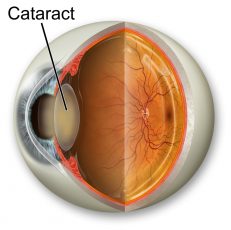Cataracts are a normal part of aging and many people with cataracts do not experience any symptoms in the early stages.
The right time to have cataract surgery depends on your individual case and simply having cataracts does not necessarily mean you need to have surgery right away.

When is the right time for cataract surgery?
In the early stages, a new prescription for your glasses or contact lenses may be sufficient to improve your vision.
However, as cataracts develop, the deterioration of your vision may begin to impact your daily activities and new glasses will no longer help.
It may be time to consider cataract surgery if you are experiencing any of the below symptoms:
- • Cloudy, foggy, or frosty vision
- • Double vision in one eye
- • Increased sensitivity to bright light and glare
- • Difficulty driving, especially at night
- • Trouble reading and recognising faces
- • Colours appear dull and faded
- • Seeing halos around light sources
- • Updating your glasses no longer provides you with clearer vision
Cloudy or Foggy Vision
When you have an advancing cataract, it may seem like you’re looking at the world through a cloud or a foggy or frosted window. This is the most common symptom of cataracts.

Double Vision
Double vision or diplopia can be caused by advancing cataracts, causing you to see two or more images of a single object when you look with one eye. However, there are many other serious health conditions that can cause double vision, and you should seek urgent medical attention.
Light and Glare Sensitivity
An increased sensitivity to lights and glare is a common symptom of cataracts. This is often experienced as discomfort when leaving a darkened room and stepping into bright sunlight, causing people to squint, shade their eyes, or turn their heads away.
Night Vision Problems
As cataracts become denser over time, less light can pass through the cloudy lens, making it increasingly difficult to see clearly in low light. This can make driving at night more difficult and dangerous. If you suspect you have cataracts or have been diagnosed with cataracts, be careful when driving at night and make the right decision to not drive if your vision is compromised.
Faded or Yellowing Colours
Another symptom of advancing cataracts is the fading, dulling, or yellowing of otherwise bright colours. This is caused by the advancing cloudy cataracts turning yellow or brownish, causing a sepia tinting of what you see, impacting your ability to differentiate colours.
Halos
As a cataract becomes cloudier, it can result in a “diffraction” or scattering of the light passing through your lens, causing halos to appear around light sources. These halos often appear as rainbow-like coloured rings around lights or bright objects. Halos can be especially noticeable at night with car headlights, taillights, and streetlights – making it very difficult to drive.
Gold Coast Cataract Surgery
Our eye surgeons are available at three convenient clinic locations, equipped for the diagnosis, treatment and management of all eye-related conditions. Cataract surgery is performed by our Ophthalmologists at Short Street Day Surgery on the Gold Coast.